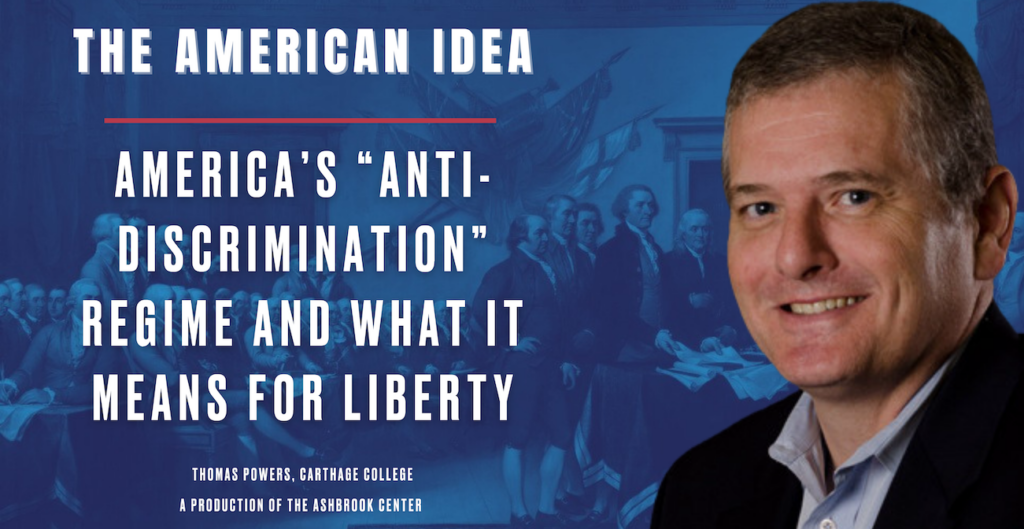What is "Anti-Discrimination" Doing to American Liberty?
October 2, 2024

Listen and subscribe to the podcast
Join The American Idea’s Listener Email list – get news about upcoming episodes and a chance to offer questions for them, too!
Today’s episode features a conversation with Professor Tom Powers, a political science professor at Carthage College and author of American Multiculturalism and the Anti-Discrimination Regime: The Challenge to Liberal Pluralism.
Jeff and Tom focus on the evolution of America’s anti-discrimination regime, tracing its trajectory from the Civil Rights Movement of the 1950s and 60s to the rise of “wokeness” in recent years. The conversation explores how the initial liberal ideals of the Civil Rights Movement, focused on individual rights and equal treatment under the law, have transformed over time.
The 1964 Civil Rights Act and its Unintended Consequences
Professor Powers argues that while the Civil Rights Movement was rooted in the liberal tradition, the 1964 Civil Rights Act, particularly Titles II and VII, marked a departure from this framework. Title VII, focusing on employment discrimination, became a pivotal point in this shift.
- Shift from Intent to Impact: While the initial focus was on overt discriminatory acts, a shift occurred towards emphasizing “disparate impact,” where any inequality between groups is suspected as discrimination, regardless of intent.
- Expansion of Discrimination: The definition of discrimination expanded beyond overt acts to include more subjective experiences like harassment, stereotypes, and hostile environments.
- Corporate Liability and the Rise of Diversity Training: The scope of corporate responsibility broadened, holding employers liable for any harassment within the workplace, leading to the emergence of preventative measures like diversity training.
The Role of the EEOC and the Supreme Court
Professor Powers highlights the significant role played by the Equal Employment Opportunity Commission (EEOC) and the Supreme Court in shaping the anti-discrimination regime.
- EEOC’s Influence: The EEOC, as the enforcement arm of Title VII, handles numerous discrimination cases annually. Their decisions and litigation strategies significantly influence the interpretation and application of anti-discrimination law.
- Supreme Court Decisions: Supreme Court decisions interpreting the Civil Rights Act, rather than constitutional law, have been the primary drivers of change in the anti-discrimination regime. Interestingly, conservative justices have often taken what appear to be left-leaning stances in these statutory cases.
The Emergence of “Wokeness” and its Roots in the Regime
Professor Powers argues that the rise of “wokeness,” often attributed to recent years, has its roots in the evolving anti-discrimination regime since the 1990s.
- Seeds of “Wokeness”: The emphasis on diversity training, policing of language and behavior in the workplace, and the increasing sensitivity to subjective experiences of harm created fertile ground for the development of “woke” ideology.
- Escalation in the 2010s: Professor Powers suggests that the 2015 Supreme Court decision on gay marriage provided significant momentum for the “wokeness” movement, further energized by events like the #MeToo movement.
Pushback and the Future of the Anti-Discrimination Regime
The podcast acknowledges the growing pushback against the current state of the anti-discrimination regime, particularly from conservatives and even some within traditionally aligned groups.
- Conservative Backlash: The emergence of legislation targeting Critical Race Theory and Diversity, Equity, and Inclusion (DEI) initiatives signifies a concerted effort to challenge the regime’s trajectory.
- Internal Divisions: Disagreements within the left, such as the debate surrounding transgender athletes in women’s sports, highlight emerging tensions within the broader coalition that championed the anti-discrimination regime.
Professor Powers suggests that the future of the anti-discrimination regime hinges on the 2024 election and the potential for significant policy shifts. He advocates for a renewed focus on civil rights education to foster a more inform

